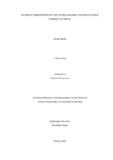
Please use this identifier to cite or link to this item:
https://hdl.handle.net/20.500.14301/501| Title: | Students' Perceptions on the Letter Grading System in Public Schools of Nepal. |
| Authors: | Sigdel, Bimal |
| Citation: | Sigdel, B.(2023).Students' perceptions on the letter grading system in public schools of Nepal. |
| Issue Date: | Oct-2023 |
| Publisher: | Kathmandu University School of Education |
| School: | SOED |
| Department: | DOEL |
| Level: | M.Phil. |
| Program: | MPhil in Educational Leadership |
| Abstract: | The letter grading system is widely used in school education to assess student performance. While it offers several advantages, such as providing clear expectations and being recognized by universities and employers, it also has potential drawbacks, including competition, stress, lack of transparency, and unfairness. This dissertation explores the interpretations of grades 10, 11, and 12 students' perceptions of the letter grading system and its implications. By analyzing their perspectives, this study aims to provide insights into the effectiveness and fairness of the system, considering the context and needs of schools. Additionally, Vygotsky's Constructivist Theory and McMillan's Fundamental Assessment Principles are examined to identify how assessments can be meaningful and valid. The findings suggest that while the letter grading system can provide valuable feedback and motivation, steps must be taken to ensure fairness and equitable implementation Educators, administrators, parents, and stakeholders need collaborate to implement the system consistently, objectively, and fairly, promoting meaningful learning experiences and accurate assessment of student performance. Finally, the study reflects on the complexities of the letter grading system and the importance of considering students' needs when choosing an appropriate grading system. |
| URI: | https://hdl.handle.net/20.500.14301/501 |
| Appears in Collections: | Dissertation |
Files in This Item:
| File | Description | Size | Format | |
|---|---|---|---|---|
| MPhil Dissertation Final -PDF File.pdf | 530.36 kB | Adobe PDF |  View/Open |
Items in DSpace are protected by copyright, with all rights reserved, unless otherwise indicated.